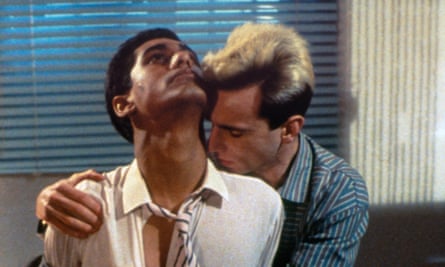Two years ago, on Boxing Day 2022, novelist and screenwriter Hanif Kureishi suffered a fall in Rome that left him paralysed. Since then, with the help of family members, he has been recounting his devastating experience of “becoming divorced from [himself]” on Substack and in a memoir, Shattered, published earlier this year.
The author, who turns 70 next month, has had to adjust just about everything in his life. But that hasn’t stemmed his creative output: as well as the memoir, this year Kureishi adapted his acclaimed novel The Buddha of Surburbia for stage with the theatre director Emma Rice, which has just finished a second run at the Barbican in London.
For those wanting to dive deeper into the author’s work, there’s plenty to explore: from his early essays and screenplays to his novels, memoirs and short stories, Kureishi’s biographer Ruvani Ranasinha suggests some good ways in.
The entry point
Next year will be the 40th anniversary of Kureishi’s groundbreaking, Oscar-nominated first screenplay My Beautiful Laundrette. The film defined contemporary British multiculturalism as funny, cool and appealing and propelled him to the fore. At its centre is the compelling, engaging gay relationship between British Asian Omar and his old school friend, white working-class, former National Front supporter Johnny. It remains Kureishi’s finest cinematic statement on the condition of England under Thatcher, defined at once by excess and austerity.

The call to arms
Kureishi published his first autobiographical essay The Rainbow Sign in 1985, having returned to London after a visit to Karachi at the age of 29. Kureishi saw Thatcher’s Britain afresh with the critical distance Pakistan had afforded him.
Inspired by James Baldwin’s moral indignation over racial oppression in America – “God gave Noah the rainbow sign, No more water, the fire next time!” – Kureishi exposed faith in a tolerant British society as a false, but widely acclaimed belief that ignored “the violence, hostility and contempt directed against black people every day by the state and individual alike”. At a time when minorities were expected to assimilate, gratefully and humbly, Kureishi’s sarcastic critique registered an important shift.
Capturing the identity crisis of a mixed-race, British-born child, The Rainbow Sign offered a unique perspective. Igniting debates on “Britishness” and “belonging” that still reverberate today, he warned prophetically: “the failure to grasp this opportunity for a … broader self-definition … of being British … will be more insularity, schism, bitterness and catastrophe”.
The controversial one
Kureishi’s novel Intimacy, published in 1998, brutally dissected the break-up of a long-term relationship. Don’t be put off by the accusations of misogyny hurled at Kureishi by many reviewers on publication – the first-person narrator’s slippery self-criticism eludes this label. Ruthlessly mining the private turmoil of his break-up with his long-term partner Tracey, Kureishi leaves us in no doubt that the selfish, self-aggrandising narrator is a critical self-portrait. The novella’s infamous line – “… there are some fucks for which a person would have their partner and children drown in a freezing sea” – needs to be qualified by Kureishi’s following observation that “Women, I’ve noticed are particularly tenacious in this respect”. Kureishi has always been in the business of challenging stereotypes, and this novel is no different.
after newsletter promotion
The one that deserves more attention
My Ear at His Heart, Kureishi’s affecting memoir about his intense, loving, contradictory relationship with his father is essential to understanding the writer, and should be more widely read.
If you’re in a rush
Try his vivid, disturbing short stories: We’re not Jews, Weddings and Beheadings or quieter, unsparing masterpieces: My son the Fanatic, Touched and Long Ago Yesterday. Or the incomparable essays on the craft of writing in the 2002 collection Dreaming and Scheming. Or else his sharply comic, noir novella The Nothing – although its fuming, elderly, wheelchair-bound protagonist Waldo’s incapacity and dependence on his younger lover now seems unbearably poignant.
The masterpiece
Kureishi’s brilliant debut novel The Buddha of Suburbia introduced a frizzy-haired, cheeky, libidinous, half-Asian teen protagonist, the likes of whom had not yet appeared in contemporary British fiction. Narrator Karim Amir’s wry, knowing tones revealed Kureishi’s gift for an intimate, playful, trenchant first-person voice.

 2 months ago
55
2 months ago
55













































